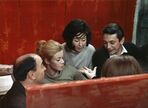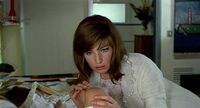The film starts with a thick fog and ends with avoiding the "fog", as if avoiding and "forgetting" can only be the way to face the unsolved problem of a lost life. The film comes to an abrupt end right in front of this unsolvable gap, and its purpose seems to be to present this gap to us, to make us question our own lives, or to have the exact opposite effect, as the woman in the film does. Everyone other than the protagonist. From this point of view, it may be particularly interesting to explore.
The heroine loves everything, every person or thing around her. Her life is a patchwork of these things, and it is from these people and things that she finds her place, which is true for everyone. And that's not the case. We are not born with a fixed place, in this universe, we have no shape and nowhere to go. Where we are is only the surface of forgetting, and our destination may be a never-ending pursuit. The heroine hopes that every thing she loves and is familiar with surrounds her, so that she can confirm herself and gain a sense of security, but in fact the things she loves do not need her, let her wander in the vast sea, as if lost and lost. sunken ship. lost. . . . Look for. . . . lost. . . . Is this her or our inevitable destiny?
The only male protagonist who is similar to her has become her last hope. She hopes that he can save her, and this is the perfect proof that she cannot be saved. He thinks that he is the same as her, and the wandering life without a destination is actually just the loss of the way of life, not the loss of existence itself. This makes him ultimately nothing more than a self-righteous vulgar passerby who watches and leaves.
This is the second Antonioni movie I've watched since "Days on the Clouds". Although I don't like it as much as "On the Clouds", the pictures are still full of familiar colors, the behavior and rhythm of the streets, objects and characters. . The beauty of "On the Clouds" is that it stops at the end, and this film spends an entire film in order to present metaphors and hints in turn, gradually filling the audience's heart with fear and heaviness. The heroine's blurred eyes, absent-minded expression, helpless behavior, and the unmanned room with the lights on, the fog that does not disperse, the ship that was forced to dock due to the sickness of the crew, the inexplicable hunger, the son's inability to stand, The blind search on the map and the longing for the full beach all spoke of her hesitation and extreme fear. Perhaps the film's rambling rhythm can feel dull, but it blends in with the intense, focused presentation and de-storytelling. Like the writing of a modern novel, what matters is no longer the story and plot, but the theme and performance.
Tear, a life that coexists within the self and outside the self. Only one of the two can be chosen. The result is an unforgettable forgetting or a pursuit without an end. Which one is more reassuring? Maybe any one is just an illusion, there is no difference between the two, and the answer can only be found in another existence (the heroine said suicide).
View more about Red Desert reviews








